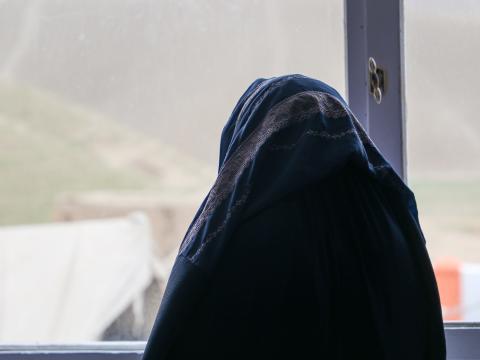Rahima's Journey to Recovery

Many Afghans suffer from mental health and psychosocial problems, with decades of conflict, instability, poverty, and natural disasters contributing factors. World Vision Afghanistan’s Mental Health and Psychosocial Support (MHPSS) programme is an integral part of all its healthcare facilities, both mobile and static. To ensure comprehensive care, all doctors, midwives, and nurses undergo training in MHPSS to provide counselling and treatment for individuals with mental health and psychosocial disorders. Additionally, the role of an MHPSS counsellor has been introduced, dedicated solely to offering counselling services. This specialised position ensures that patients receive focused attention and support tailored to their mental health-related needs.
Rahima*, 25, is a resident of Faryab province who has been struggling with mental health problems. Her forced marriage and family violence in her in-laws' household were the primary reasons for her mental health issues. Though being married, she was returned to her father’s home by her in-laws against her will. Due to her family's financial constraints, they struggled to afford Rahima’s treatment, resorting to selling their home appliances to cover the costs. Despite initial improvements while taking medication, her condition would relapse once she stopped due to poor financial conditions.
A year ago, Rahima's family brought her to WV Afghanistan’s health centre, operating under its FRAMES (Fostering Resilience in Afghanistan through Multi-sector Emergency Support) project in a remote village in Faryab Province. She was withdrawn and unresponsive, even to the WV Afghanistan psychosocial nurse, due to her mental health condition. After initial assessments, WV Afghanistan’s psychosocial nurse, Mahbooba*, and her team recognised Rahima's severe stress and mental health issues. They decided to refer her to a hospital in Maimana City for specialised treatment, which WV Afghanistan covered including medication and transportation. While she showed some improvement initially, Rahima still faced verbal abuse from villagers, prompting her family to relocate to Maimana City in hopes of a more supportive environment.
“I was monitoring the patient closely,” said Mahbooba. “I kept in touch with her sister, who informed me of Rahima’s deteriorating condition and her family’s decision to send her back to her husband’s home.”
However, Rahima's in-laws refused to accept her, leading to her husband divorcing her, exacerbating her situation. Her feelings of frustration with her situation led her to having thoughts of violent actions and harming others. Despite the challenges, Mahbooba remained hopeful, believing in Rahima's potential for recovery.
Together with Rahima’s family, Mahbooba arranged for her referral to a well-equipped hospital in another province for further treatment. After a week-long hospitalisation, Rahima returned, and WV Afghanistan’s psychosocial support nurse conducted regular counselling sessions with her, encouraging her family to facilitate her social interactions. Mahbooba continued, “I held regular counselling sessions with her and provided medication for two weeks until she began opening up and sharing about her life.”
With time, Rahima’s health improved, becoming more social and engaged with others. She immersed herself in vocational pursuits, focusing on her future rather than dwelling on her past. “She is much more sociable now,” Mahbooba noted. “Her health has improved significantly.”
In a few weeks, Rahima began attending the clinic independently. She now dreams of vocational opportunities and is actively pursuing them, demonstrating her improved capabilities. Mahbooba and the entire clinic team were delighted to witness the positive transformation in Rahima’s life, despite the initial lack of hope for her recovery.
*Names are changed to protect identities.